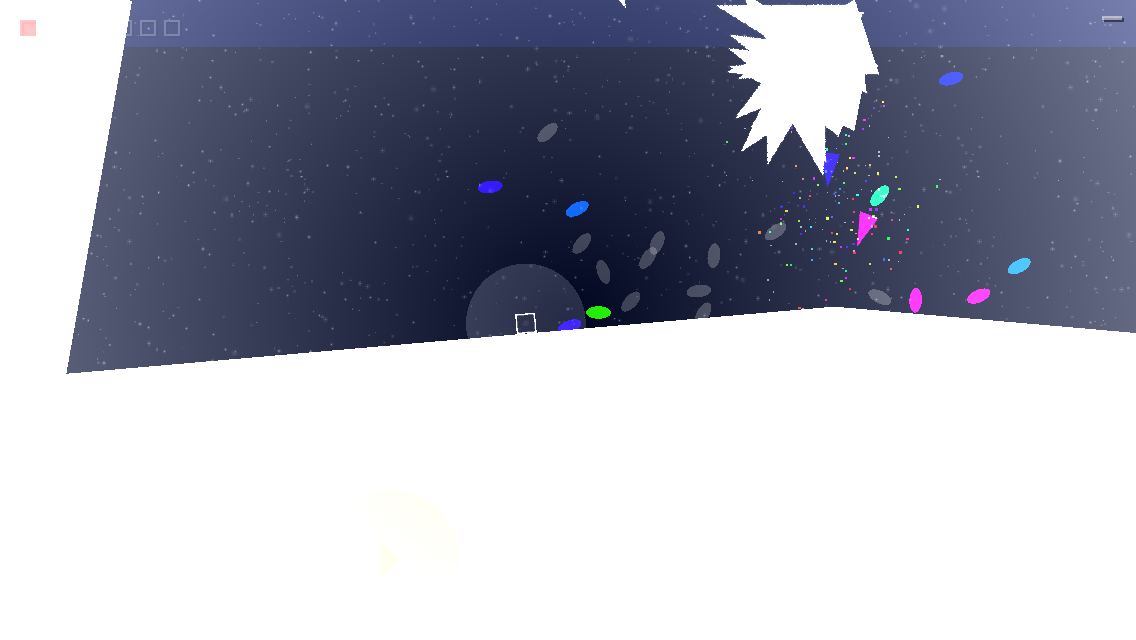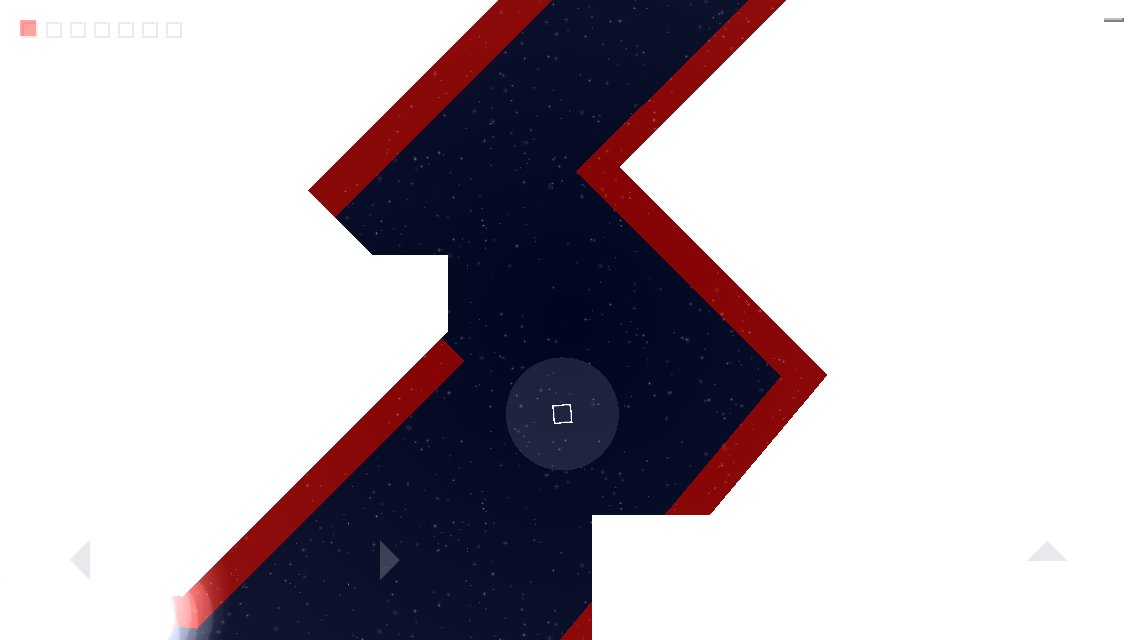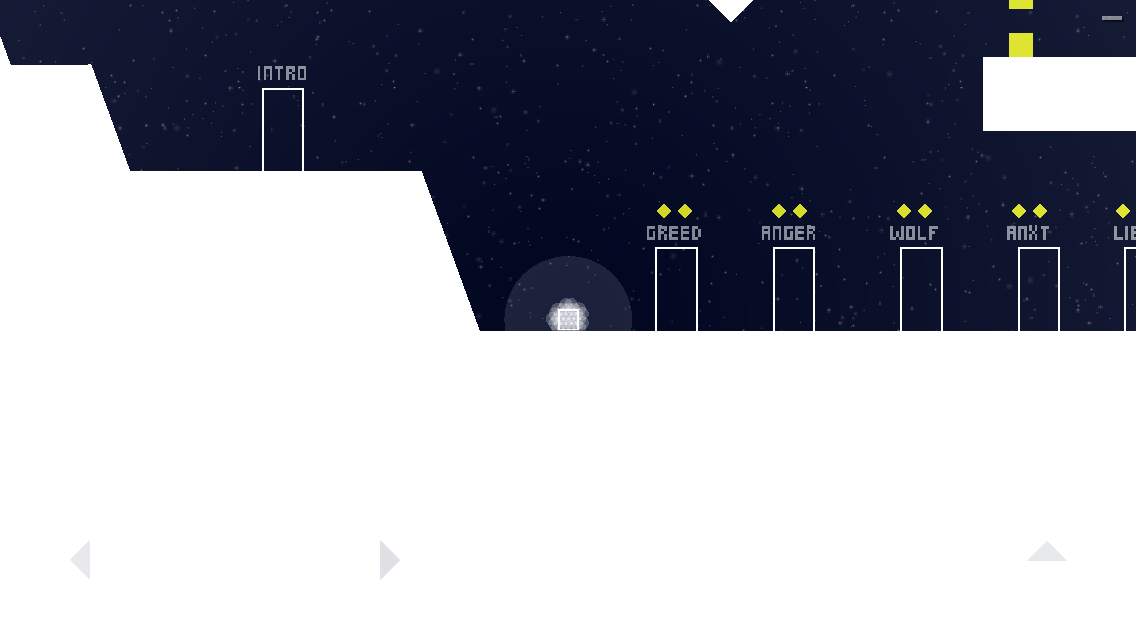 David ($1.99) is a curious little game. Recently, due to the release of the beautiful Monument Valley ($3.99), I’ve talked a bit about experience-focused games versus mechanics-focused games, but David seems to have one foot planted firmly in each camp. It’s about as minimalist as one could possibly imagine, yet the most immediate comparison in terms of gameplay is considered a technical masterpiece for the hardware it runs on. The appearance of the game is incredibly simple, and its gameplay is as basic as moving, jumping, and shooting, but it still somehow manages to create a surprisingly complex and tense gameplay experience that pleases the senses.
David ($1.99) is a curious little game. Recently, due to the release of the beautiful Monument Valley ($3.99), I’ve talked a bit about experience-focused games versus mechanics-focused games, but David seems to have one foot planted firmly in each camp. It’s about as minimalist as one could possibly imagine, yet the most immediate comparison in terms of gameplay is considered a technical masterpiece for the hardware it runs on. The appearance of the game is incredibly simple, and its gameplay is as basic as moving, jumping, and shooting, but it still somehow manages to create a surprisingly complex and tense gameplay experience that pleases the senses.
Recently released on Mac and PC and just now making its way to iOS, David is essentially a game built around boss battles, inspired by Sony’s Shadow of the Colossus on PlayStation 2. The inspiration is clear, but David is a much more boiled down version of the concept. While a couple of the stages have some platforming sequences, don’t come into this expecting a game where you traverse through levels. Instead, each of the nine stages in the game pits you against a large, aggressive threat in arenas of various sizes and shapes. Some of the stages have gimmicks that you must solve en route to defeating the boss, but the game generally comes down to quick thinking and fast reflexes.
Each stage must be cleared on two difficulty settings, “okay" and “very", in order to open up the final stage. “Okay" gives you a big life bar, allowing you to make tons of mistakes and still live to win the day. It’ll likely only take most players a handful of minutes to run through the initial eight stages on this difficulty level. “Very" gives you just a single point of health, forcing you to master the fight completely if you hope to win. Not many people are going to be seeing that last stage anytime soon, and even fewer are going to beat it on the higher difficulty setting.
You play as a little square named David, whose abilities are limited to moving left and right, jumping infinitely, and firing a powerful charged shot. For moving left or right, you have your choice of virtual buttons or tilt, with jumping always mapped to a virtual button. You can jump in the air as many times as you want, so it’s less of a jump and more of a, dare I say it, flap. To fire a shot, you have to touch David for a second to charge it, then flick it in your desired direction. The controls are pretty straightforward, but they also end up being the biggest strike against the game.
You see, David is a very demanding game. You’ll frequently need to be doing all three things David can do at the same time. A person only has two thumbs, though, so the end result feels a bit like rubbing one’s tummy while patting one’s head while putting on a sock. On “Okay", you have a margin for error, so taking a hit here or there while you reposition your fingers isn’t the end of the world. On “Very", however, this problem becomes a lot bigger. It’s certainly possible to work around it, but I felt like I was fighting the controls as much as I was fighting the enemies themselves. My strategies tended to revolve around what I could do to keep myself out of situations where I had to jump, move, and shoot at the same time as opposed to reacting to what the boss was doing, specifically.
You’re going to die a lot in pursuit of that ninth stage, and occasionally that’s not going to be entirely your fault. At the very least, David offers almost instant restarts, so you can get right back in the action after any death. The bosses all have to be handled in a particular way, and figuring that way out ends up being enjoyable on two levels. First, simply finding the way to get through, but then, finding the way to get through without taking a hit. I enjoyed how the game lets you learn the way it works while playing sloppily, but doesn’t let you see the end until you truly master playing it. It makes what could be a very short game in theory work out to be a very satisfying experience.
David isn’t a conventionally pretty game by any means, relying on very simple, sharply-defined shapes to create its images, but it still ends up looking dazzling. In many ways, representing the big monsters as loosely collected piles of triangles makes them even more intimidating. There’s an unpredictability to them, like your brain can’t quite get a bead on which part of them is going to do what at any given moment. As you chip away at them, pieces fall off, which not only gives you a clear visual on your progress, but also changes the nature of the fight. With a smaller form composing a slightly different shape, the way they interact with the environment changes quite a bit as the fight progresses. This unpredictability gives the game’s main game unexpected replay value, since the boss fights always come out a little bit differently.
Speaking of replay value, while you’ll have to work very hard to unlock the last story stage, finishing all eight of the initial stages on the lowest difficulty will give you a pretty nice reward. Doing so will unlock the game’s endless arena mode, where aggressive collections of shapes will come in infinite waves, getting bigger and more dangerous as you go along. Defeating a collection of shapes earns you a point, which gives you a point of health immediately, and allows you to power up David in a few different ways. You have to beat your previous score to earn more points towards leveling things up, so you can’t just grind on the weaker enemies and beef yourself up. It’s a great extra that almost stands as a game in and of itself. The only thing it’s missing is Game Center leaderboard support.
While the game is a bit rough around the edges (right now it’s not running properly on a handful of devices including the original iPad Mini) and certainly takes some time to get used to, David is definitely a game that’s worth your attention. It’s a piece of clever design that somehow makes epic battles out of pure simplicity. Sure, sometimes you’re going to be cursing the game when things don’t quite work the way they should, but it’s a very small price to pay for the thrilling high of outmaneuvering an opponent far more powerful than you, yanking victory from the jaws of defeat. It’s a game that can be confident in its lack of overt story because it makes its own stories through play. You can check out the thread in our forums if you’re looking for more impressions or information.


